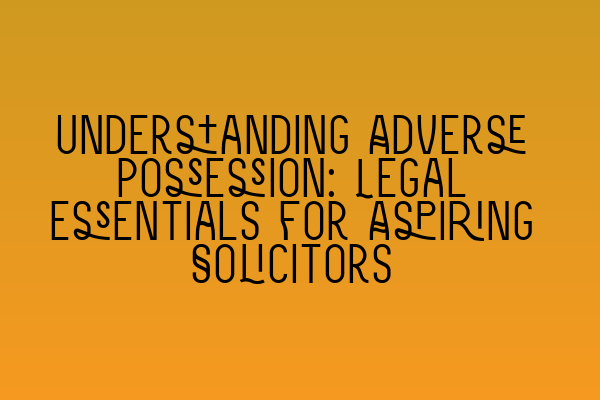Understanding Adverse Possession: Legal Essentials for Aspiring Solicitors
Welcome to SQE Property Law & Land Law, where we strive to provide comprehensive guidance on a wide range of legal topics. In this blog post, we will delve into the intricate world of adverse possession. As an aspiring solicitor, it is crucial to grasp the legal essentials surrounding this concept. So, let’s dive right in!
What is Adverse Possession?
Adverse possession refers to a legal doctrine that allows an individual to acquire ownership of someone else’s property by occupying and using it for a specified period. This doctrine is founded on the principle that landowners should not neglect their property and allows for a transfer of ownership in certain circumstances.
To establish adverse possession, certain key elements must be met. These elements include actual possession, exclusive possession, continuous possession, and possession without the owner’s consent. It is essential to understand each element in detail to fully comprehend adverse possession.
Actual Possession: The Key to Claiming Adverse Possession
One of the fundamental requirements for adverse possession is actual possession of the property. This means that the individual must physically occupy and control the land, treating it as their own. Mere occasional use or sporadic visits would not meet the threshold of actual possession.
To strengthen their claim, the person seeking adverse possession should demonstrate acts of ownership, such as erecting fences, cultivating the land, or making improvements. These actions will serve as evidence that they have taken possession of the property in question.
Exclusive Possession: The Importance of Sole Control
Another critical aspect of adverse possession is exclusive possession. This means that the individual must possess the land to the exclusion of all others, including the true owner. There should be no shared use or control of the property by anyone else during the period of adverse possession.
The courts scrutinize claims of adverse possession closely, examining whether the individual asserting adverse possession had exclusive access and control over the land. If other parties also had access or shared use of the property, it may weaken the claim of adverse possession.
Continuous Possession: The Need for Uninterrupted Control
Continuity of possession is vital in establishing adverse possession. The individual seeking adverse possession must show continuous occupation and use of the property over a specified period. This means that there should be no extended periods of abandonment or non-use.
The continuous possession requirement may vary, depending on the jurisdiction and circumstances. In some jurisdictions, the possession period can range from 10 to 12 years, while in others, it may be as long as 20 years. Legal professionals should consult local laws and precedents to determine the specific time frame applicable to their case.
Possession without the Owner’s Consent: The Essence of Adversity
The final element to establish adverse possession is the absence of the owner’s consent. Adverse possession can only occur when the occupier possesses the land hostilely, without the owner’s permission. This means that the occupier’s possession must be inconsistent with the owner’s rights.
However, it is important to note that hostility does not necessarily imply ill intent or animosity. It simply refers to the possession being contrary to the owner’s interests, such as when an individual openly uses the land as their own without seeking permission or recognizing the owner’s rights.
Understanding the Implications and Challenges of Adverse Possession
Adverse possession can have significant legal implications for both the occupier and the true owner of the land. For the occupier, successfully claiming adverse possession can result in the acquisition of legal ownership. This can be particularly valuable if the land has substantial market value or sentimental significance.
On the other hand, adverse possession can be a challenging scenario for the true owner. They may lose legal title to their property if they fail to take timely action to challenge the adverse possessor’s claim. This underscores the importance of vigilance and regular monitoring of one’s land to prevent adverse possession situations from arising.
Conclusion: A Vital Area of Property Law to Master
Adverse possession is a complex and fascinating area of property law that aspiring solicitors should fully comprehend. By understanding the key elements of actual possession, exclusive possession, continuous possession, and possession without the owner’s consent, you will be better equipped to advise clients and handle adverse possession cases.
To further enhance your knowledge and preparation for the SQE exams, we recommend exploring our comprehensive SQE 1 and SQE 2 preparation courses. Additionally, our practice exam questions and mocks can help you gauge your progress and identify areas for improvement.
Stay up-to-date with the latest SRA SQE exam dates and continue expanding your legal expertise to excel in your future career as a solicitor.
[Related Articles:
SQE 1 Practice Exam Questions,
SQE 1 Practice Mocks FLK1 FLK2,
SQE 2 Preparation Courses,
SQE 1 Preparation Courses,
SRA SQE Exam Dates]
Do you have any questions or would you like assistance with any other property law or land law topics? Feel free to reach out to SQE Property Law & Land Law – your trusted source for all things legal.
